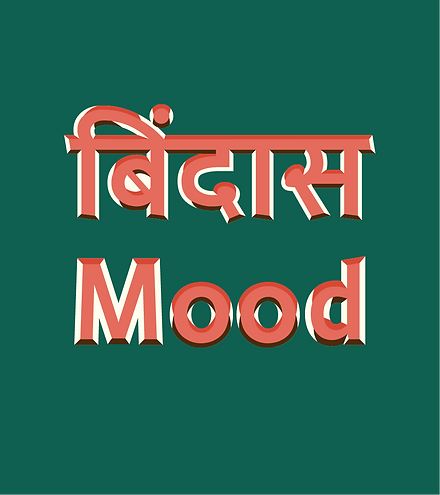thOda this, thOda that
CREATED
Apr 2022
WORK
Typographic Research
The Hinglish Phenomenon–Learn the hybrid language
In India, every two miles the water changes, every four miles the speech. There are 122 major and 1,600 minor languages spoken in India, colloquialisms vary not only from region to region but from city to city. Hinglish is a mix of Hindi and English spoken by upwards of 350 million people in urban India. Because words in different languages cannot simply be replaced and expected to behave exactly the same.
Thoda This, Thoda That means "a little bit of this, little bit of that"; denoting the spirit of Hinglish- little Hindi and a little English. The objective of these cards is to allow non-Hindi (Hinglish) speakers to familiarize themselves will the language of the streets of India. General Hindi lessons might teach you to count or say that you're hungry but they lack in the vernacular. This project allows you to learn the pronunciation and meaning of Hinglish that one uses in everyday conversations. So now you can better understand the dialogues of the new Bollywood film, or taunt your Indian friend with Indian sarcasm.
Code-Switch a Little!
Hindi can be difficult to enunciate! You can practice by hearing the pronunciation or reading the phonetic spelling. In the spelling, syllables are separated with a hyphen(-) and the letters that are in capitals pronounced with a stress.
Hover over the cards below to read about the phrase and listen to the pronunciations.





















Project Background
Hinglish is a mix of Hindi (the official language of India) and English (an associate official language) that is spoken by upwards of 350 million people in urban areas of India. English was brought to India when the Britishers colonized the country. Apart from stealing the natural resources and making people fight their wars, they adopted many Indian languages’ words to their language. Today English is not secondary to Hindi. The switching between the two languages over the years has created the amalgamation called Hinglish. It is popular because Hindi and English equally dominate a regular bilingual’s life.
Hinglish is not made of just slangs, it is spoken and written (mostly texting) unconsciously. Even the most essential words like ‘Sorry’ and ‘Thank You’ are have become an indispensable part of our vocabulary; the Hindi translation of these words almost feel awkward to say out loud. Such foreign words have become a part of day-to-day speech so much so that it becomes difficult to find a Hindi substitute for these words. Hinglish also involves the replacement of the Devanagari script for Hindi with the Latin script. In fact, this hybridized language has become the norm thanks to the surge of internet and online communications.